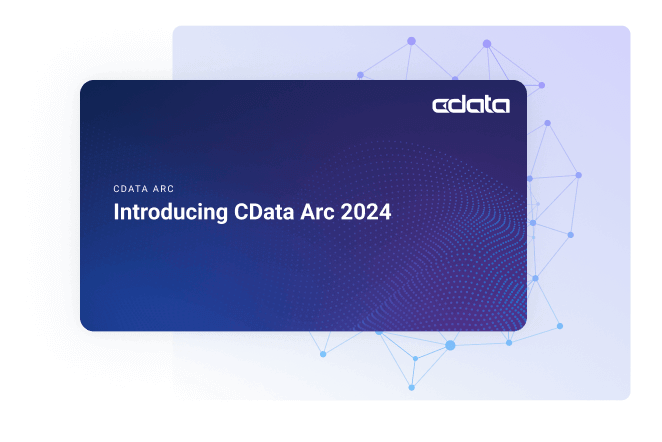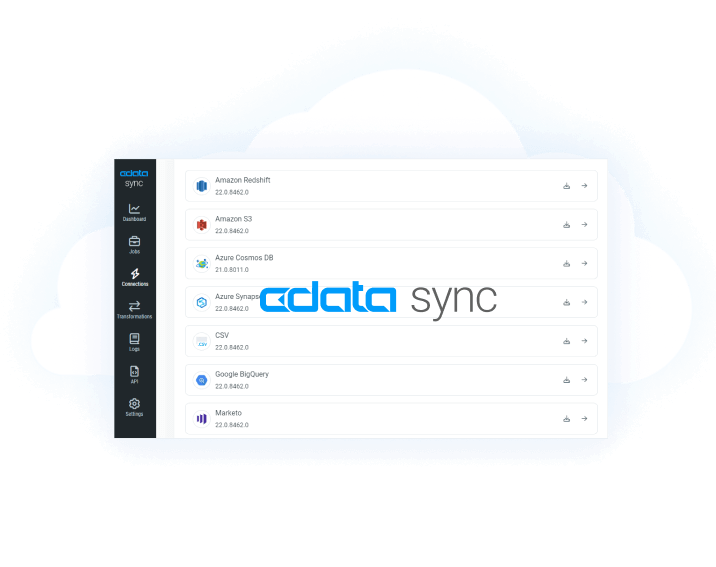Discover how a bimodal integration strategy can address the major data management challenges facing your organization today.
Get the Report →CData Software - Knowledge Base
Latest Articles
- Replicate Data from Multiple Files in an Amazon S3 Bucket Using CData Sync
- Replicate Data from Multiple Local Files Using CData Sync
- Driver Guide: Marketing Analytics Predefined Reports
- Displaying Data from Related Tables Using Angular with Connect Server
- Deploying CData Sync in a Kubernetes Environment
- Excel Add-In Getting Started Guide
Latest KB Entries
- Jetty Security Notice Overview
- Upsert Salesforce Data Using External Id in SSIS
- NuGet Repository Overview
- SAP Drivers Overview
- Embedded Web Server (.NET) - Potential Medium Security Vulnerability
- Configuring Incremental Replication in CData Sync
ODBC Drivers
- [ article ] Connect to and Query Salesforce Data in QlikView ...
- [ article ] Working with Redis Data in Microsoft Excel and ...
- [ article ] Configuring ODBC Connections in Informatica on ...
- [ article ] Import Google Spreadsheets data into FileMaker Pro
JDBC Drivers
- [ article ] Use SQL with the CData JDBC Driver for Twitter to ...
- [ article ] Use the CData JDBC Driver for Salesforce in ...
- [ article ] Discovering SaaS, Big Data, and NoSQL Metadata ...
- [ article ] Enable the CData JDBC Driver for QuickBooks in ...
SSIS Components
- [ kb ] SSIS Components: Source Output ColumnName Does Not ...
- [ article ] Access SAP Tables and SAP Queries using CData SAP ...
- [ article ] Use the CData SSIS Components to Insert New or ...
- [ kb ] How to Replicate Data Between MySQL and SQL Server ...
ADO.NET Providers
- [ article ] Create OData Services with the Salesforce Data ...
- [ article ] Perform API Operations Using Stored Procedures in ...
- [ article ] Using SQL to Query Gmail
- [ article ] How to connect Salesforce to SQL Server with SSIS
BizTalk Adapters
- [ article ] How to Generate Updategrams with the CData BizTalk ...
- [ article ] Configure a Solicit-Response Send Port for the ...
- [ article ] Configuring a Receive Location for the CData ...
- [ article ] Tutorial: Create and Process Updategrams with the ...
Excel Add-Ins
- [ article ] Install a Microsoft Excel Add-In Manually
- [ article ] Video: Connecting to Google BigQuery Data from ...
- [ article ] Excel Files as Data Sources Using CData ADO.NET ...
- [ article ] Bill an Invoice with the CData Excel Add-In for ...
API Server
- [ article ] Easily Integrate with Any RESTful API Using the ...
- [ article ] API Server Cloud Tunneling Capabilities
- [ article ] Building Dynamic D3.js Apps with Database Data
- [ article ] Editing API Driver API Profiles
Data Sync
- [ article ] Supporting CDC from a Oracle Multitenant ...
- [ article ] Configuring Oracle Autonomous Database as a CData ...
- [ article ] CData Sync - History Mode
- [ article ] Get Started with CData Sync for Marketo
Windows PowerShell
- [ article ] PowerShell Cmdlets Getting Started Guide
- [ article ] Import QuickBooks Online Data to QuickBooks ...
- [ article ] Reconciling Authorize.net Transactions with ...
- [ article ] Query Google Calendars, Contacts, and Documents ...






